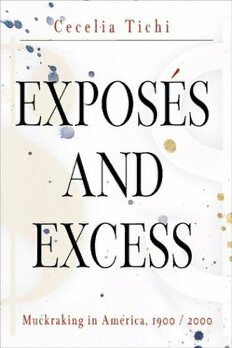
Exposés and Excess: Muckraking in America, 1900/2000 PDF
Preview Exposés and Excess: Muckraking in America, 1900/2000
Exposes and Excess PERSONAL TAKES An occasional series of short books in which noted critics write about the persistent hold particular writers, artists, or cultural phenomena have had on their imaginations. Exposes and Excess Muckraking in America, 1900 I 2000 CECELIA TICHI PENN University of Pennsylvania Press Philadelphia Copyright © 2004 University of Pennsylvania Press All rights reserved Printed in the United States of America on acid-free paper 10 9 8 7 6 5 4 3 2 1 First paperback edition 2005 Published by University of Pennsylvania Press Philadelphia, Pennsylvania 19104-4011 Library of Congress Cataloging-in-Publication Data Tichi, Cecelia, 1942- Exposes and excess : muckraking in America, 1900 I 2000 I Cecelia Tichi. p. em.-(Personal takes) Includes bibliographical references and index. ISBN 0-8122-3763-3 (alk. paper).-ISBN 0-8122-1926-0 (pbk.: alk. paper) 1. journalism-Social aspects-United States. 2. Social problems-Press coverage-United States. 3. United States-Social conditions-20th century. I. Title. II. Series. PN4888.S6T53 2004 302.23'0973-dc21 2003056363 We are now in a second Gilded Age. Instead of taking steps that would strengthen our democracy, we're heading backward to the wealth inequali ties of a century ago. -Bill Gates Sr. and Chuck Collins, The Nation, january 27, 2003 We have not grown too hubristic as producers and consumers; we have grown too timid as citizens, acquiescing to deregulation and privitization and a growing tyranny of money over politics .... But consumers are not citizens, and markets cannot exercise democratic sovereignty. The ascen dant market ideology claims to free us, but it actually robs us of the civic freedom by which we control the social consequences of our private choices. -Benjamin Barber, New York Times, july 29, 2002 What empires lavish abroad, they cannot spend on good republican gov ernment at home: on hospitals or roads or schools. A distended military budget only aggravates America's continuing failure to keep its egalitarian promise to itself -Michael Ignatieff, New York Times Magazine, january 5, 2003 The phrase, "narrative as rhetoric," means ... that narrative is not just story but also action, the telling of a story by someone to someone on some occasion for some purpose. -James Phelan, Narrative as Rhetoric, 1996 Contents 1. From The jungle to Fast Food Nation: American Deja Vu 1 2. Bulked Up and Hollowed Out: Looking Backward, Looking Forward 18 3. Muckrakers c. 1900: Civic Passions, "Righteous Indignation" 62 4. Muckrakers c. 2000 105 Barbara Ehrenreich, Nickel and Dimed: On (Not) Getting By in America 113 Eric Schlosser, Fast Food Nation: The Dark Side of the All-American Meal 129 Naomi Klein, No Logo: Taking Aim at the Brand Bullies 147 Laurie Garrett, Betrayal of Trust: The Collapse of Global Public Health 168 Joseph T. Hallinan, Going Up the River: Travels in a Prison Nation 187 Epilogue: Tipping Point, or the Long Goodbye? 207 Bibliography 219 Index 227 Acknowledgments 233 Chapter 1 From The jungle to Fast Food Nation American Deja Vu In 2001, forty-five Vanderbilt University students, doubtless hoping for a film-and-literature course, enrolled in my "Twentieth-Century American Blockbusters." These blockbusters were books, not movies, I explained that hot, late August day. The titles, I emphasized, deserved the name "block buster" according to the dictionary definition of experience so over whelmingly forceful that it radically changes people's minds. The books appearing on the reading list, I pointed out, had changed pub lic opinion on a range of issues. They included Rachel Carson's Silent Spring and Betty Friedan's The Feminine Mystique, both engines of the nascent environmental and feminist movements in the later twentieth century. Our semester together would let us investigate why certain books, both fiction and nonfiction narratives, have proved pivotal to social change. In a multimedia era, I wanted students to examine these narratives and their historical eras to discover how and why the book can be a social power tool. We began with Upton Sinclair's 1906 best-seller The jungle. The stu dents were horrified by the disgusting Chicago packinghouse condi tions represented in the novel. Like Sinclair's contemporary readers, the students of 2001 overlooked the heinous workplace conditions in favor of a self-interested focus on meat contamination, verifYing Sin clair's wry remark that he had aimed for the public's heart and hit the stomach instead. Yet to a point all were sympathetic with the Lithuan ian immigrant family struggling against impossible odds to earn their living as packinghouse workers in a socially corrupt and toxic environ ment. I informed them that President Theodore Roosevelt had read The jungle and dispatched two agents to Chicago to verify Sinclair's claims, whereupon they reported "meat shovelled from filthy wooden floors ... in all of which practices it was in the way of gathering dirt, splinters, floor filth, and the expectoration of tuberculosis and other diseased workers" (qtd. in Tindell and Shi 951).
